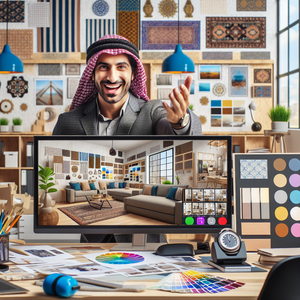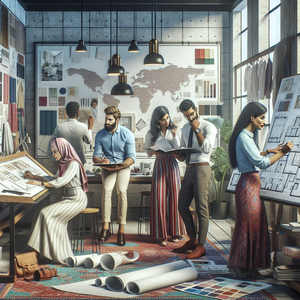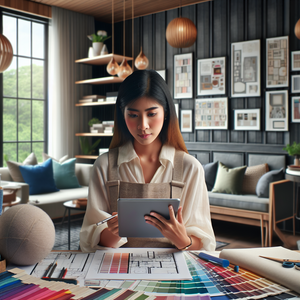
Navigating the World of Freelance Interior Design: Roles, Requirements, and Market Trends
Embarking on a freelance interior design career is a thrilling adventure that combines artistry, technical skill, and entrepreneurial ambition. This article delves into various career paths available to aspiring interior designers and provides insights into what it takes to succeed in this dynamic field. While pursuing a formal education, such as a bachelor's degree in interior design, can provide a solid foundation, many successful designers have carved their paths through hands-on experience and self-directed learning. The freelance design arena is inclusive, attracting individuals from diverse backgrounds and skill sets. To excel in this competitive landscape, freelancers must prioritize building a strong portfolio, engaging in meaningful networking, and remaining informed about current design trends. Additionally, understanding the intricacies of the market—including job growth, salary expectations, and demographic insights—can significantly influence career trajectories. This article presents a detailed overview of various freelance interior design roles, outlining their responsibilities, requirements, and contributions to the industry while offering a glimpse into potential career paths.
Job Summaries:
Freelance Interior Designer:
- Freelance interior designers focus on transforming spaces tailored to their clients' needs, preferences, and budgets.
- They conduct consultations, develop innovative design concepts, select materials, and oversee project implementation.
- While possessing a degree in interior design is beneficial, a compelling portfolio showcasing a range of work is essential.
- Mastery of CAD software, color theory, and familiarity with building codes are vital.
- Additionally, strong marketing and networking skills are crucial for attracting clients.
- This role thrives on personalized service, allowing designers to craft unique solutions that resonate with individual aesthetics.
Interior Design Consultant:
- Interior design consultants offer expert guidance to clients looking to elevate their spaces without managing the entire design process.
- They assess client needs, provide suggestions for layouts, color schemes, and furnishings, and help source materials.
- A degree in interior design is advantageous, but practical experience and exceptional communication skills are essential for translating client visions into actionable plans.
- This role is invaluable for guiding clients through the initial design phases, ensuring their aspirations are both feasible and in line with industry standards.
Interior Design Project Manager:
- Project managers in interior design oversee all facets of design projects, from inception to completion.
- They coordinate schedules, manage budgets, and liaise with contractors to ensure adherence to client specifications.
- A background in interior design, coupled with project management experience, is crucial for this role.
- Familiarity with design software and strong organizational skills are necessary to ensure project efficiency, harmonizing creative vision with practical execution.
Interior Stylist:
- Focusing on aesthetic appeal, interior stylists curate and accessorize spaces to create specific visual impacts.
- They work across various environments, including residential, commercial, and event settings, selecting furnishings, art, and décor.
- Although an interior design degree can be beneficial, a discerning eye for aesthetics, creativity, and trend awareness are paramount.
- Collaborating with photographers or staging homes for sale can enhance the stylist's impact.
- This role elevates the appeal of spaces, making them visually captivating and market-ready.
Sustainable Interior Designer:
- Sustainable interior designers prioritize eco-friendly practices.
- Sourcing sustainable materials is a key focus.
- Advocating for energy-efficient solutions is essential.
- A degree in interior design is preferred.
- Training in sustainability enhances qualifications.
- Knowledge of LEED certification can bolster credibility.
- This role is increasingly vital due to client emphasis on environmental considerations.
- Designs aim to be both beautiful and sustainable.
Residential Interior Designer:
- Residential interior designers specialize in creating personalized home environments that reflect their clients' lifestyles.
- They manage the design process from concept to final installation.
- A degree in interior design is often required, along with strong creative and technical skills.
- Understanding client dynamics and budget constraints is crucial in this role.
- This role significantly impacts clients' daily lives by fostering harmonious and functional living spaces.
Commercial Interior Designer:
- Commercial interior designers focus on creating functional and visually appealing environments for businesses, including offices, hotels, and retail spaces.
- A bachelor’s degree in interior design and knowledge of commercial codes are essential.
- Strong project management and communication skills facilitate collaboration with stakeholders.
- Enhancing customer experiences and workplace functionality through innovative design solutions.
Event Space Designer:
- Event space designers are responsible for creating temporary or semi-permanent installations for various occasions, from weddings to corporate events.
- They work closely with clients to develop themes, layouts, and décor.
- A background in interior design and experience in event planning can be beneficial.
- Creativity and spatial awareness are key to crafting memorable experiences through tailored design.
Interior Design Educator:
- Interior design educators play a crucial role in shaping the next generation of designers by teaching principles, techniques, and current trends.
- They may work in academic institutions or offer workshops and online courses.
- A degree in interior design along with teaching experience is necessary.
- A passion for sharing knowledge and strong communication skills enrich this role, contributing to the industry's future.
Virtual Interior Designer:
- With the rise of technology, virtual interior designers provide remote services.
- Conducting consultations and creating design concepts through digital platforms.
- A background in interior design and proficiency in design software are required for this increasingly relevant role.
- Allowing designers to reach a broader audience beyond geographical constraints.
Freelance Interior Design Writer:
- Freelance writers in interior design create content covering design trends, tips, and best practices for various publications and online platforms.
- A solid understanding of the industry and excellent writing skills are essential.
- A background in interior design or journalism is beneficial.
- This role plays a significant part in disseminating knowledge and inspiring others.
- Contributes to the ongoing discourse surrounding interior design.
3D Visualization Specialist:
- 3D visualization specialists produce realistic renderings of design concepts using software such as SketchUp or 3ds Max.
- They collaborate closely with interior designers to help clients visualize projects before implementation.
- A degree in design or architecture, along with expertise in visualization software, is required for this role.
- This role enhances communication and decision-making processes.
Color Consultant:
- Color consultants specialize in selecting color palettes that consider lighting, mood, and functionality.
- They work with both residential and commercial clients, providing expert guidance on color theory and application.
- A background in interior design or art, along with a solid grasp of aesthetics, is advantageous.
- This role significantly influences the ambiance of spaces, shaping how clients and visitors experience environments.
Furniture Designer:
- Furniture designers create custom pieces that balance functionality and aesthetics.
- They often collaborate with interior designers to develop unique solutions tailored to specific design themes.
- A degree in industrial design or furniture design, along with strong technical skills, is typically required.
- This role enhances the field by offering bespoke solutions that elevate overall design and utility.
Interior Design Social Media Manager:
- Social media managers in interior design promote services through various platforms.
- Curating content that showcases projects and engages potential clients.
- Strong communication skills and a background in marketing or design are beneficial.
- This role is vital for building a brand presence and attracting clients.
- Leveraging social media trends to enhance marketing efforts.
Home Stager:
- Home stagers prepare properties for sale, enhancing visual appeal through strategic design choices.
- They select furnishings, décor, and layouts that highlight a home’s best features.
- A background in interior design and strong aesthetic judgment are crucial in this role.
- This significantly aids sellers in presenting homes attractively to increase marketability.
Exhibition Designer:
- Exhibition designers create layouts and displays for museums, galleries, and trade shows.
- A solid understanding of spatial design and visitor experience is critical.
- A degree in interior design or a related field, along with project management experience, is preferred.
- This role enhances public engagement with art and information through thoughtful design, making it vital in the cultural landscape.
Lighting Designer:
- Lighting designers specialize in creating lighting plans that enhance both ambiance and functionality.
- They collaborate with architects and interior designers to integrate effective lighting solutions.
- A background in interior design or architecture with a focus on lighting is necessary.
- This role significantly impacts the overall aesthetic and utility of spaces, influencing mood and functionality.
Interior Design Researcher:
- Interior design researchers analyze trends, materials, and technologies to inform design practices.
- They gather data and insights that help designers make informed decisions.
- A background in design or a related field is essential for this role.
- Strong analytical skills are essential for this role.
- This role supports innovation and relevance within the industry.
Architectural Interior Designer:
- Architectural interior designers bridge the gap between architecture and interior design.
- They focus on how the interiors relate to overall building structures.
- They collaborate closely with architects to create cohesive designs that respect both form and function.
- A degree in architecture or interior design is essential.
- Strong spatial awareness and problem-solving abilities are important.
- This role ensures that interiors are aesthetically pleasing, structurally sound, and functional.
The varied roles within the freelance interior design sector illustrate the multitude of opportunities available for those passionate about design. With determination, the right skills, and a proactive approach to networking and marketing, individuals can carve out successful careers across various design disciplines. As the demand for freelance interior designers continues to rise, grasping market insights—including job growth rates, average salaries, and demographic trends—will be crucial for aspiring professionals. Explore current openings for these exciting positions and embark on your journey in the vibrant world of freelance interior design!
Explore More Jobs

